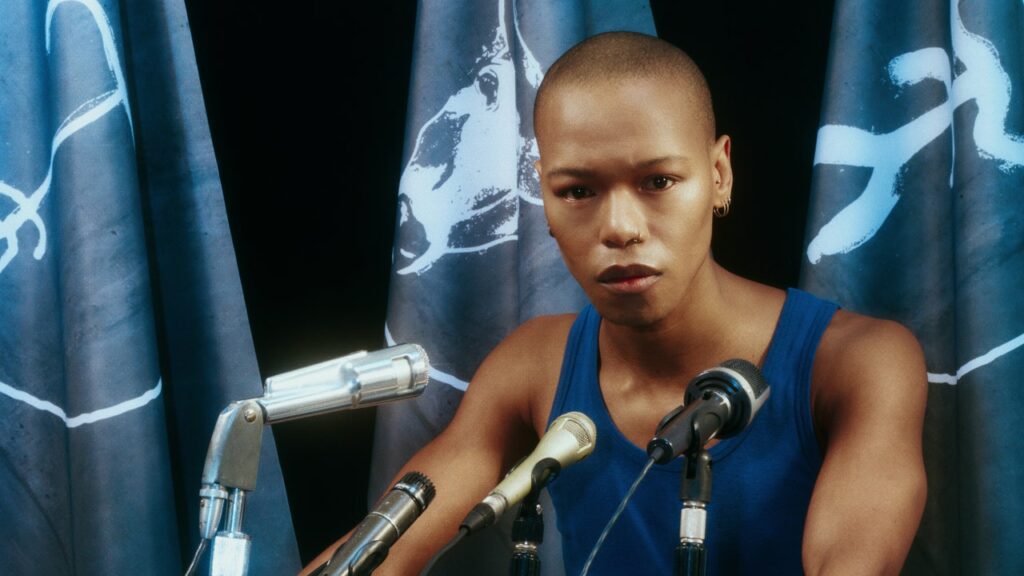
When Nakhane began writing Bastard Jargon, they were hell-bent on making “a sex album,” as they explained to Vogue earlier this year. The South African singer-songwriter, now based in South London, devised their third full-length as an outburst of joy—a jubilee meant to contrast with their earlier, more melancholy work. But even as they built each song drums first, crafting experimental dance pop pulsing to four-on-the-floor beats, darkness found a way of creeping in. “It ended up being what I call an existentialist sex album,” Nakhane said in the same interview. “It’s fun, but there’s always this kind of memento mori in the background, a fear that you’re fucking up, or a reckoning with your mistakes.”
There isn’t much in the way of explicit sex on Bastard Jargon, but you’ll catch quick glimpses of erotica, like sneaking a peek through a cracked bedroom door. Nakhane presents themselves as vulnerable and emboldened in these personal vignettes: They moan, recline “splayed and physical,” and replay nights of carnal ecstasy while sipping their morning coffee. Nakhane’s scenery is hushed and intimate, so they designed their narration to feel familiar, as if they were serenading someone over the phone, or chatting with a lover in bed, each word muffled slightly by pillows. But rather than calibrate the instrumental tracks to mirror that intimacy, Nakhane and a cast of contributors—including executive producer Nile Rodgers, John Congleton, and Max Hershenow (aka Alexmaax)—occasionally clog the album with dated production and unimaginative arrangements. Nakhane’s songs have strong bones, but they could benefit from fewer—or different—collaborators.
Nakhane was intent on recording a big, blissful third album, and most of the songs on Bastard Jargon are written in major keys. But instead of resembling modern dance hits, certain songs sound taped from pop-rock airwaves of the late ’80s and early ’90s, and the layers of instruments fail to add nuance or depth. “The Conjecture” plods along to tin-can drums and a bristly synth pattern that loops for most of the song. The thin backing track can’t stand up to Nakhane’s velvet-lined voice, and the effect feels a bit like a pop diva doing karaoke. Their multi-tracked chorus doesn’t help: the melody is fluffy and a little too sweet, like a bale of cotton candy.
Early single “Do You Well” is a slight improvement, but it still has the gloss of generic feel-good disco. The addition of Perfume Genius does little, as his voice gets smothered in snapping drums and reverb. On the chorus, bright keys follow Nakhane’s vocal hook like a dot bouncing across words in a lyric video, an on-the-nose choice that feels especially cloying. The “memento mori” Nakhane spoke of is nowhere to be found in these melodies. Both “The Conjecture” and “Do You Well” might have flourished with a few dark or subversive production details.
Getting a little ragged and dirty serves Nakhane well, as evidenced by “Tell Me Your Politik,” Bastard Jargon’s best song. The track bumps to big nasty synth blasts, live percussion, muted hand claps, and sampled shouts that erupt just beneath the surface of the mix. Nakhane coats their voice in subtle distortion, eliminating any potential schmaltz, while a warm, crackling sax solo from Shabaka Hutchings lends a handcrafted feel. At the center of “Tell Me Your Politik” is a verse from South African artist Moonchild Sanelly, who snaps and flexes in English and her native Xhosa. It is an energetic contrast to Nakhane’s elegant timbre.
Opener “The Caring” is also propelled by less obvious parts: a drum machine that sounds like a crumbling rock, a programmed squeak that recalls a Brazilian cuíca. The chorus hearkens back a few decades, but it nods to post-new wave bands like General Public and Londonbeat—a forgotten but spry vintage of pop music. “The Caring” is also where Nakhane unwittingly articulates what might be Bastard Jargon’s chief flaw: “I was so full of light/I was blinding,” they sing over palm-muted guitar. Nowhere is this truer than on stadium-pop ballad “Hold Me Down,” which has the DNA of a huge hit but the production value of a compressed demo. The angel-choir backing vocals feel cheap and cheesy, as do the glowing beams of synthesizer. The chorus is so catchy, Nakhane’s voice so lush, that “Hold Me Down” could have been recorded with a fraction of the bells and whistles—the light that bounces off of them is blinding indeed.
